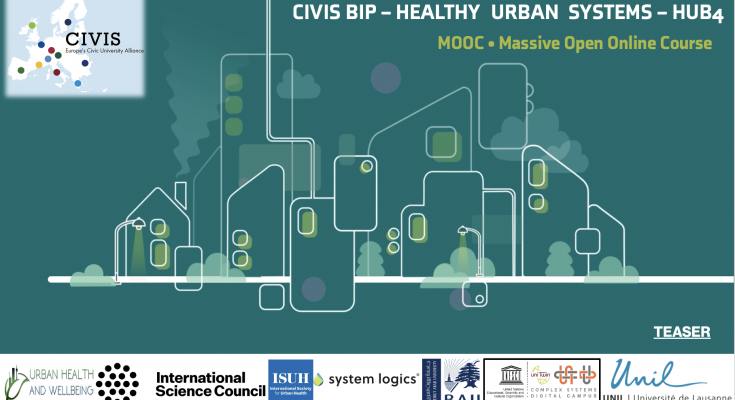The BIP (Bended Intensive Program) Healthy Urban Systems is part of CIVIS action gathering 11 European universities to develop teaching and research. It is part of the HUB4: Cities, territories, and mobilities.
The BIP consists of training a group of students who follow:
1. The MOOC Healthy Urban Systems – UNIL/Coursera (12 weeks) (30 International specialists)
The MOOC is available in 3 parts:
Teaser : https://youtu.be/o3b2_lyoLwY
PART I: Modules 1 & 2: Concepts and Observation
MODULE 1: A multidisciplinary framework
MODULE 2: Observing, measuring, and representing
https://www.coursera.org/learn/urban-health-mooc-1
PART II: Modules 3 & 4: Theories and Models
MODULE 3: Theoretical frameworks
MODULE 4: Tools for modeling
https://www.coursera.org/learn/healthy-urban-systems-2/
PART III: Modules 5 & 6: Design and Policies
MODULE 5: Scenario design
MODULE 6: Policies and governance
https://www.coursera.org/learn/healthy-urban-health-systems-3/
2. A final face-to-face training in the University of Lausanne
This face-to-face training replaced the folder that is required for the basic validation of the MOOC. They will be able to obtain the 6 modules provided by UNIL.
It was organized in Lausanne on the theme: The hotspots in Chavannes-près-Renens
Dates: 1-6 July 2024
Teachers of the Face-to-face training
- Aix-Marseille University (AMU): Sebastien Gadal, Professor of Geography in Geomatics and Spatial Analysis
- Aix-Marseille University (AMU): Vincent Laperriere, Associate Professor of Geography in Multi-agent Systems and Spatial Analysis
- Paris Lodron University Salzburg: Martin Loidl, Geographical Information Systems, PostDoc Researcher – Head of Mobility Lab at Department of Geoinformatics
- University of Nice: Sandra Perez, Associate professor of Geography and health and machine learning
- University of Lausanne: Celine Rozenblat, Professor of the geography of cities, networks and complex systems
- Free University of Brussels: Benjamin Wayens, lecturer and research logistician in urban studies
Background and issues
Disease shapes cities and in turn, how cities are designed has direct health effects. The history of cities has always been intertwined with that of diseases. The COVID-19 pandemic has made clear how important it is to understand the transmission of a virus in its urban environment. Urban health is defined by complex urban systems design and behavior: city infrastructure, mobility, density, and movement of people, living and housing conditions, food systems, urban healthcare systems, the economy, education and communication systems, and also urban planning and design.
What is unique about urban health, is the broad understanding of the root causes of health and disease, as described by planetary boundaries and social determinants of health; how they affect the health of citizens and of the city itself, and how urban responses can build synergies and contribute to health, wellbeing and equity as well as ensure the planet carrying capacity is preserved. Urban health responds both to the ecological boundaries and the social foundation as illustrated in the Doughnut Economics image by Kate Raworth.
The complexity of urban systems generates opportunities but also risks to the health of people and the environment. Core to the health of urban systems is an understanding of the nature of complex urban systems. As they are partly plannable but also spontaneously emerge, different types of knowledge need to be applied: precise scientific knowledge and heuristic knowledge. Therefore, it is paramount to create a better understanding of what urban systems are, how they can be modeled, and how people can apply that knowledge to better cope with urban complexity to improve health and well-being.
Objectives
The BIP Healthy Urban Systems provides systemic conception and tools of health as the pulse of the new urban agenda for different postgraduate students and long-life learning. It is dedicated to supporting students and professionals in health, urban planners, and actors and communities, to improve their practice of urban health.
The BIP Healthy Urban Systems aims to support scientists and practitioners to:
– Better understand and evaluate social, environmental, ecological, and psychological systemic interactions adversely affecting the health and well-being of people living, working, and visiting cities
– Build capacity to view urban health as a complex system, with multi-dimensional and multi-scale eco-systemic frameworks
– Mobilize all the actors directly or indirectly linked to urban health, in designing resilient and sustainable healthy cities.

